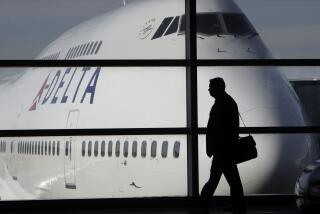AT&T; Ordered to Doublecheck Faulty Systems : * Communications: The government makes the unprecedented move after two disruptions of long-distance networks.
- Share via
WASHINGTON — Responding to the New York phone outage two months ago that blocked millions of calls and delayed hundreds of plane flights, the Federal Communications Commission said Friday that it is requiring American Telephone & Telegraph to conduct extensive studies of its operations.
In releasing a detailed report on the September system breakdown, the second massive failure in the New York area in 10 months, the FCC criticized management practices that it said contributed to the problem.
“Serious questions have been raised with respect to whether AT&T; is providing adequate management focus on network operations,” Richard Firestone, chief of the FCC’s Common Carrier Bureau, said at a press conference.
On Sept. 17, a power outage at a Manhattan switching center disrupted 4.5 million domestic calls and about 500,000 international calls. The outage shut down 80% of the Federal Aviation Administration’s phone circuits, resulting in 1,174 canceled or delayed flights affecting 85,000 passengers.
Firestone said the FCC had decided not to fine AT&T; because willful intent was not a factor in the incident. But he said the agency was imposing on the company a series of requirements that he characterized as the first of their kind.
Under the FCC requirements, AT&T; has one month to produce reports on its power and alarm systems and emergency procedures at all AT&T; offices similar to the New York facility where the outage occurred.
The company also must decide within 30 days whether it will continue any existing power-sharing arrangements under which it agrees to switch to internal power sources at the request of commercial utilities on days of high electrical demand.
The FCC report said a power-sharing agreement with Consolidated Edison in New York contributed to the September outage. The agency is requiring AT&T; to submit risk-benefit analyses before entering into any new agreements.
AT&T; also must undertake two other studies, one of which would include “a complete analysis of the vulnerability of its entire network to . . . unintentional disabling events,” the FCC said.
AT&T; officials promised to comply with the requirements. “Most of the analyses required in today’s FCC report have already been completed, and recommended actions are being implemented,” the company said. “We will comply promptly with all recommendations made by the commission.”
The FCC report on the incident concludes that the outage was caused by “three levels of failure: power equipment, alarm systems and management.” The incident occurred after the facility switched from commercial electrical power to an in-house generator at the request of Consolidated Edison. But the in-house generator failed, and unbeknownst to workers, the center switched automatically to a backup battery system.
The battery system kept the facility running for six hours before it died, causing the outage. During the six hours, AT&T; workers failed to notice that alarms had been activated. The alarm system “consisted of dated equipment, which was placed in functionally obsolete locations, and was in a state of general neglect and disrepair,” the report stated.
Ironically, the FCC said, all of the personnel normally responsible for monitoring the alarms were attending a training session on a new alarm system that was being installed. The construction apparently had disabled much of the system, the report said.
In outlining the FCC’s findings, Firestone said the agency’s study was “highly critical” of AT&T;, the nation’s largest long-distance carrier. But he suggested that the pressures of the marketplace may prove to be the most effective remedy.
“In a highly competitive market, the failure to provide reliable service is a critical failure” that will affect customers’ reliance on AT&T;, he said.
AT&T; made a similar observation in its statement. “We are continuing to improve steps to further implement network reliability and minimize vulnerability to unintended events,” the company said. “Our strongest motivation in doing so is our own keen awareness of our customers’ dependence on us.”
The AT&T; system has experienced four major disruptions since January, 1990. Last Tuesday, an outage that AT&T; blamed on human error blocked most long-distance calling in New England and caused flight delays as far away as New York.
The FCC report noted that the company’s share of the telecommunications market “declined from more than 90% in 1984 to less than 65% in 1990, while the shares of its largest rivals have more than tripled in the same period.”






